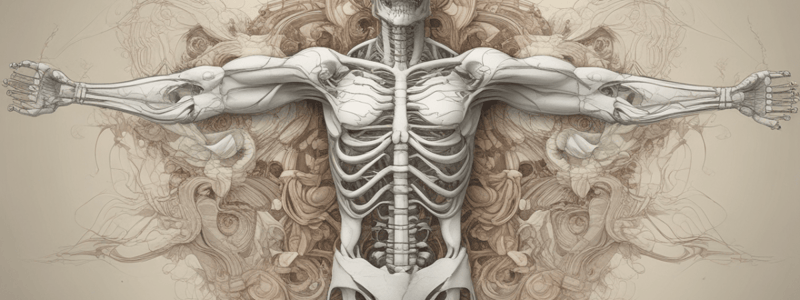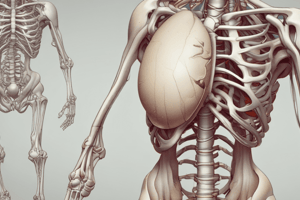Podcast
Questions and Answers
Which of the following lymph nodes are situated medial to the femoral vein?
Which of the following lymph nodes are situated medial to the femoral vein?
- Superficial inguinal lymph nodes
- Deep inguinal lymph nodes (correct)
- Popliteal nodes
- Cloquet's node
Which of the following structures forms the roof of the obturator canal?
Which of the following structures forms the roof of the obturator canal?
- Inguinal ligament
- Sacrotuberous ligament
- Obturator membrane (correct)
- Sacrospinous ligament
Which of the following vessels and nerves pass under the inguinal ligament?
Which of the following vessels and nerves pass under the inguinal ligament?
- Femoral neurovascular bundle (correct)
- Sciatic nerve
- Obturator neurovascular bundle
- Tibial nerve
What is the shape of the arrangement of the superficial inguinal lymph nodes?
What is the shape of the arrangement of the superficial inguinal lymph nodes?
Which of the following lymph nodes receives lymph from the lower back and gluteal region?
Which of the following lymph nodes receives lymph from the lower back and gluteal region?
Which of the following foraminae is formed by the presence of the sacrospinous and sacrotuberous ligaments?
Which of the following foraminae is formed by the presence of the sacrospinous and sacrotuberous ligaments?
Which of the following structures anchors the sacrum?
Which of the following structures anchors the sacrum?
Where do the lymphatics from the superficial inguinal lymph nodes pass to?
Where do the lymphatics from the superficial inguinal lymph nodes pass to?
Which of the following bony landmarks is located at the superior end of the ilium?
Which of the following bony landmarks is located at the superior end of the ilium?
What is the name of the joint formed by the articulation of the ilium and the sacrum?
What is the name of the joint formed by the articulation of the ilium and the sacrum?
Which of the following iliac spines is located at the most anterior point of the ilium?
Which of the following iliac spines is located at the most anterior point of the ilium?
What is the name of the ridge that forms the inferior border of the ilium?
What is the name of the ridge that forms the inferior border of the ilium?
Which of the following bones fuses with the pubis to form the ischiopubic ramus?
Which of the following bones fuses with the pubis to form the ischiopubic ramus?
What is the approximate angle of deviation from the vertical axis of the femur?
What is the approximate angle of deviation from the vertical axis of the femur?
What is the name of the bony landmark located on the pubis?
What is the name of the bony landmark located on the pubis?
What is the primary function of the angle of anteversion?
What is the primary function of the angle of anteversion?
Which of the following statements is true about the iliac tuberosity?
Which of the following statements is true about the iliac tuberosity?
What is the consequence of an excessive angle of anteversion?
What is the consequence of an excessive angle of anteversion?
What is the name of the surface on the ilium that articulates with the sacrum?
What is the name of the surface on the ilium that articulates with the sacrum?
What is the resulting gait pattern in individuals with an excessive angle of anteversion?
What is the resulting gait pattern in individuals with an excessive angle of anteversion?
Around which axis does the rotation of the femur occur?
Around which axis does the rotation of the femur occur?
What is the name of the Latin term that means 'a bending aside' or 'an avoiding'?
What is the name of the Latin term that means 'a bending aside' or 'an avoiding'?
How can an excessive angle of anteversion be easily identified?
How can an excessive angle of anteversion be easily identified?
What is the consequence of lateral rotation compromise in individuals with an excessive angle of anteversion?
What is the consequence of lateral rotation compromise in individuals with an excessive angle of anteversion?
What is the primary reason why the medial rotators cannot provide a counter-pull in hip fractures?
What is the primary reason why the medial rotators cannot provide a counter-pull in hip fractures?
Which type of hip fracture has a poorer healing outcome?
Which type of hip fracture has a poorer healing outcome?
In which age group is osteoporosis twice as likely to occur in females compared to males?
In which age group is osteoporosis twice as likely to occur in females compared to males?
What is the primary reason why the angle of inclination is a factor in hip fractures?
What is the primary reason why the angle of inclination is a factor in hip fractures?
What is the most common cause of hip fractures in the elderly?
What is the most common cause of hip fractures in the elderly?
What is the term for the interruption of the blood supply to the head of the femur?
What is the term for the interruption of the blood supply to the head of the femur?
Why is avascular necrosis a clinical emergency?
Why is avascular necrosis a clinical emergency?
What increases the rate of bone loss in post-menopausal women?
What increases the rate of bone loss in post-menopausal women?
What is the typical age range for the condition that tends to have a progressive onset and gradually becomes more pronounced over time?
What is the typical age range for the condition that tends to have a progressive onset and gradually becomes more pronounced over time?
What is the primary goal of treatment for the condition that occurs in young children?
What is the primary goal of treatment for the condition that occurs in young children?
What is the approximate number of hip replacement operations performed every year worldwide?
What is the approximate number of hip replacement operations performed every year worldwide?
What is the typical age range for osteoarthritis of the hip?
What is the typical age range for osteoarthritis of the hip?
What is the primary consequence of osteoarthritis of the hip?
What is the primary consequence of osteoarthritis of the hip?
What is the term for the bony spurs that develop around the margins of the joint in osteoarthritis of the hip?
What is the term for the bony spurs that develop around the margins of the joint in osteoarthritis of the hip?
What is a significant risk factor for osteoarthritis of the hip?
What is a significant risk factor for osteoarthritis of the hip?
What is the final condition that is likely to cause pain around the hip?
What is the final condition that is likely to cause pain around the hip?
Flashcards are hidden until you start studying
Study Notes
Ilium
- The ilium has a crest superiorly, known as the iliac crest, which has a bump called the iliac tubercle.
- The iliac crest and tubercle are readily palpable.
- The ilium has a ridge at the bottom called the arcuate line, which is part of the pelvic inlet.
- The ilium articulates with the sacrum behind, forming the sacroiliac joint.
- The articular surface is known as the auricular surface, resembling the external ear or auricle.
- Above the auricular surface is a roughened area for ligaments to attach, supporting the sacroiliac joint.
Pubis
- The pubis has two rami, superior and inferior, which run from the body of the pubis.
- The inferior ramus fuses with a ramus from the ischium to form an ischiopubic ramus.
- The pubis has a pubic tubercle and a pubic crest.
Lymph Nodes
- There are few deep lymph nodes in the lower limb, with a small cluster behind the knee joint (popliteal nodes).
- There are also deep inguinal lymph nodes at the top of the thigh, medial to the femoral vein.
- One of these nodes is commonly found in the femoral canal, known as Cloquet's node.
- Superficial nodes are restricted to the superficial inguinal lymph nodes around the saphenous opening.
- These nodes are arranged in a "T" shape, with the horizontal limb receiving lymph from the lower back and gluteal region, and the medial part receiving lymph from the superficial fascia of the anterior abdominal wall and external genitalia.
Pelvic Foraminae
- The vessels and nerves of the lower limb originate inside the abdomino-pelvic cavity and need to pass out of this space to reach their destination.
- There are three routes out of the pelvis: under the inguinal ligament, through the obturator canal, and through the greater and lesser sciatic foramina.
- The femoral neurovascular bundle passes under the inguinal ligament to gain access to the anterior thigh.
- The obturator neurovascular bundle escapes through the obturator canal to reach the medial compartment of the thigh.
- The posterior route is through the greater sciatic foramen, leading to the gluteal region and posterior compartments of the thigh and leg.
Femur
- The femur rotates about the mechanical axis, whose center runs through the head of the femur.
- The normal angle of anteversion is around 12-15 degrees, which helps to keep the shaft of the femur in alignment with the center of gravity.
- Excessive angulation of the femur can put strain on the hip muscles and lead to a toe-in gait.
- The axes of the femur are important for understanding hip fractures and osteoarthritis.
Hip Fracture
- The location of the hip fracture has a bearing on its chances of a successful outcome.
- Intertrochanteric or subtrochanteric fractures are extracapsular and have a better healing outcome.
- Fractures on the neck (transcervical) or just below the head (subcapital) are likely to cause interruption of the joint and have a poorer prognosis.
Blood Supply of the Hip Joint
- One major complication of any displacement of the femoral head is "avascular necrosis," where the blood supply to the head of the femur is interrupted.
- A hip dislocation is a clinical emergency, and the head of the femur will die within 6 hours if denied a blood supply.
Osteoarthritis of the Hip
- Osteoarthritis of the hip occurs in epidemic proportions worldwide, with approximately 800,000 hip replacement operations performed every year.
- Most operations are done in patients over the age of 60, and females outnumber males by a ratio of 3:1.
- It is a relatively rare condition in individuals below the age of 40, but can affect young joints if there has been previous trauma to the joint.
- Risk factors include obesity and previous trauma to the joint.
Studying That Suits You
Use AI to generate personalized quizzes and flashcards to suit your learning preferences.




